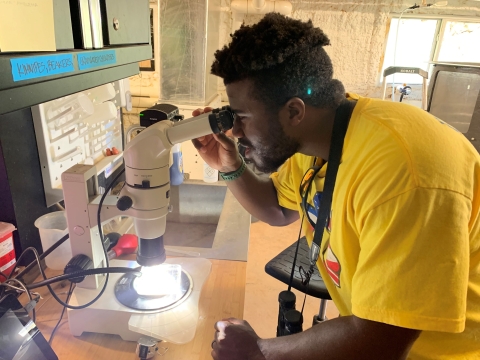In Defense of Our Natural Resources
This story is part of a series called In Defense of Our Natural Resources, highlighting the success of the Army’s partnership with the U.S. Fish and Wildlife Service (USFWS). The Army has dedicated more than $13M in 2023 and 2024 to execute projects restoring habitat, preserving endangered species , and protecting critical ecosystems across 152 installations.
The Army and the U.S. Fish and Wildlife Service are committed to empowering early career professionals to take on these mission critical roles and providing valuable employment experience. This feature highlights the work of Elwynn Sherman, Biological Field Intern at Fort Cavazos.
Spotlight - Elwynn Sherman
Elwynn Sherman is a Biological Field Intern placed at Fort Cavazos, Texas through a partnership with the Army and the U.S. Fish & Wildlife Service. Sherman’s position assists with a wide variety of critical conservation tasks – trapping invasives, monitoring endangered species, and more – all with the goal of preserving native ecosystems at the installation and beyond.
So, how did you find this position?
I found this position on the Texas A&M Job Boards website. This site was very helpful as it not only showed positions in the state, but also those offered outside of Texas. There are several filters where people can look for internships, seasonal positions, undergrad/graduate positions, post-doc appointments, and full-time positions.
What does your day to day look like in the field?
My day to day varies. I have to say that this job has so many things to do that our mission for the day can change at the drop of a hat. In the six weeks that we have been here we have worked with teams that do feral hog trapping, cowbird trapping, bird banding and nest-checking for black-capped vireos (formerly listed endangered species). Additionally, we have assisted in night mobile surveys for bats, locating breeding pairs of golden-cheeked warblers (currently listed endangered species), and stocking ponds with channel catfish.
Surprisingly, there is more to come in the following weeks! When we aren't doing any of these things, we are either looking for old hunter blinds/stands and deer feeders that are illegally left on the installation by hunters or we are doing trail maintenance by trimming trees and vegetation.
What are the goals for your project?
The purpose of this internship is for us to diversify our experience with several facets of wildlife conservation/management. The different teams we work with all have varying goals. Removing invasive species invasive species
An invasive species is any plant or animal that has spread or been introduced into a new area where they are, or could, cause harm to the environment, economy, or human, animal, or plant health. Their unwelcome presence can destroy ecosystems and cost millions of dollars.
Learn more about invasive species reduces their numbers so that native species have better opportunities to thrive in their habitat.
Monitoring endangered and threatened species allows us to track individuals and monitor their populations, while stocking ponds provides better recreational fishing opportunities for the public. Additionally, the grounds maintenance we conduct helps to prevent illegal hunting and aids military vehicles so they can move efficiently during training exercises, and for our department to properly conduct deer spotlight surveys in the fall.
To sum up the overall goal of these varying job duties, it would have to be contributing to habitat and wildlife conservation in some facet.
Do you have any favorite on the job moments so far?
So far, my favorite memories have to be catching snakes that are hiding under the hunter blinds or finding a baby Plains Spotted Skunk (I've never seen one before this job)! I've had the opportunity to participate and experience many different facets of working with wildlife!
What’s next for you?
After this internship, I am going to apply for full-time federal jobs. I would absolutely love to work within the FWS! I went to the USFWS Southwest Region Early Career Conservationist Workshop in Albuquerque, NM at the end of July. It was so great to meet other interns, talk with mid- and late-career professionals, and have some awesome experiences in New Mexico!
Attending that workshop made me want to work as a refuge manager later in my career, but for my immediate future, post-internship, I'm looking at any federal position as a biologist just to get my foot in the door. I don't know what will be available towards the end of this experience, but I'm excited nonetheless.





